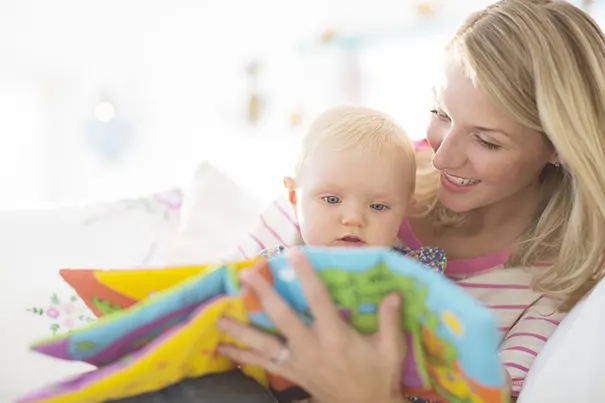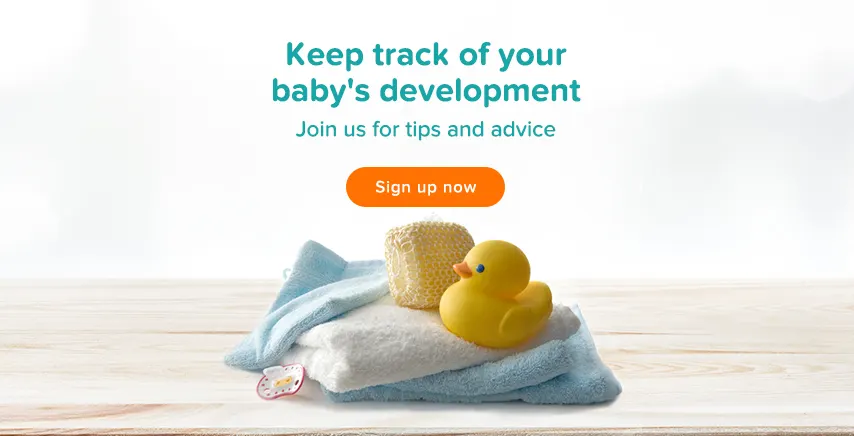Learning to talk: how kids learn to speak
Many parents worry about their child's language development. It's a vital part of every child's development and this guide will help you know what to expect, and when.
How Babies Communicate
Even before they can speak, young children are quite skilled in getting their needs across – whether it's crying to signal they're hungry, cooing when they're happy, turning their faces away from a food they don't like or pointing at a toy that they want. These early sounds and gestures are simple forms of communication that lay the foundation for richer, language-based communication later on.
Just like adults who are learning a foreign language, young children usually understand more than they can speak. Child development experts make a distinction between what kids can understand (called 'receptive language') and what they can say (called 'expressive language'). It's easy to tell what your child can say; you just have to listen to her. But how can you tell what your child understands? One way is by observing how she reacts to the things you say.
When will by baby learn her name?
Many children start to recognise the sound of their name when they're somewhere between four and eight months old. You can tell when it happens for your child by gently calling her name and seeing whether she turns to face you. But make sure that she's really reacting to the name, and not just to the tone or the sound of your voice.
When will my baby say her first words?
Around the time of their first birthdays, children usually start to say their first words. But by the time they're roughly 20 months old, many kids learn as many as nine new words every day – more than 250 new words every month! And when they're about two years old, children often hit another milestone: They start to combine words into two-word 'sentences', like 'all gone milk' (meaning either 'I've finished my milk' or 'I knocked my milk cup off the high chair').
It's hard to pinpoint a specific age when every child can be expected to hit a particular stage of language learning. However, most children reach the basic language milestones within a couple of months of one another. If you have any questions or concerns about your own child's language development, be sure to bring them up with his healthcare provider.
Speech Development Checklist:
9 Months:
Does she turn her head when you gently call her name?
Does she make babbling sounds, like 'ma-ma', 'da-da' or 'ba-ba'?
12 Months:
Say at least one word?
18 Months
Say several single words?
2 Years
Recognise names of familiar people, objects and body parts?
Point to an object or picture when it's named for him?
Repeat words overheard in conversation?
Use two-word 'sentences'?
Follow simple instructions?
Helping your child develop their speech
1. Start Early
From the day she's born, you can talk, sing and read to your child, to help start her on the road to learning. Try talking or singing during meal time, bath time and even while changing nappies. It'll be valuable for her, and fun for both of you. When reading to her, talk to her about the story and the illustrations.
2. Talk With—Not At—Your Child
Even when your child is still in the babbling stage, the two of you can still have 'conversations'. Treat your child's babble like language, and answer back with real words as if you understand what she's saying (even if you don't). Then let her 'reply' with some more babble. It may seem like a silly game, but you're teaching your child how conversations work, and how to take turns speaking and listening.
3. Play the Name Game
You can help your child to learn new words by saying the names of your child's favourite things while the two of you use them: 'Here comes the ball' or 'Mmmm... cereal'. Once your child gets the hang of a word, you can also check her understanding by asking 'Where's the ball?' and letting her answer by pointing at the ball. Or, once she's a little older and knows how to say the word, you can ask, 'What's this?' and let her say, 'Ball!'
4. Build and Expand
When your child speaks in one- or two-word sentences, include her full meaning in your reply. For example, if she says, 'No duck,' you might answer with 'You don't want the duck?' (or, in a different context, 'You can't find the duck?'). That way, you can confirm that you understand what she means, and simultaneously introduce the structure of the complete sentence.
The important thing to remember is that most language development arises naturally from the sorts of activities that you and your child do every day.
Take advantage of opportunities to talk, read, sing and play with your child. It will help your child to learn, and also help to strengthen the bond between you. Most important, you'll both have fun doing it, too.

